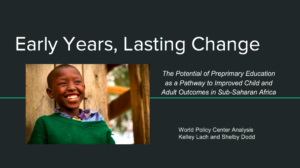Portfolio Item 3: Early Childhood Access in Sub-Saharan Africa Presentation
Link to “Early Years, Lasting Change” Presentation (.pptx file)
About the “Early Years, Lasting Change” Presentation
My “Early Years, Lasting Change” presentation captures an intersection of my research interests that I found valuable to explore in-depth through this project: early childhood education and global development. This project was situated within a course on “Global Economic Development and Education” with Dr. Carolyn Heinrich, and it provided the opportunity to explore both policy analysis and data analysis. It sharpened my ability to see a research question through multiple lenses, to find meaningful and relevant data sources from which to begin to answer the question, and to convey that process in a concise and engaging format. For me, it was an additional opportunity to explore a strong area of interest of mine, which is how to present complexities in the metrics of “global development”, early childhood education’s impacts, and how policy influences practical realities for children and families.
I enjoyed this opportunity to deeply engage in a specific question—how does “childhood protective” policy translate into early childhood education provision and enrollment, and in turn, does that have an impact on important outcomes for well-being?—and take a simple but meaningful approach to answering it. Throughout the process, I became a better consumer of literature, as well as a more savvy user of Stata’s platform to perform basic statistical analysis according to the training I had received up until that point. Further, I navigated complex databases and reconstructed a data set using data from multiple sources, which required making decisions commonly faced by researchers as they navigate incomplete or divergently defined sets of data (i.e. selecting the years of data to use, when years of available data were not consistent across the region). As I assembled the presentation, I was able to identify the most relevant information to provide out of these inquiries, and to engage my audience not just in the results of the project, but in the importance of the questions being asked.
I developed this artifact in collaboration with my classmate Kelley Lach, which added a rewarding element of teamwork and collaboration to the process. The collaborative process itself was valuable, as it strengthened my abilities to develop a complex project (involving research through both empirical evaluations and policy-related documents, consolidating and communicating that background research, and conducting data analysis work using World Policy Center and World Bank data among other sources) engaging two diverse perspectives, experiences, and skillsets to achieve the goals of the project. Collaborative work is particularly rewarding for me, as I appreciate the opportunity to have my viewpoints refined and challenged by someone else, which strengthens the research process, provides me opportunities to look at questions from a new lens, and improves the final outcome.